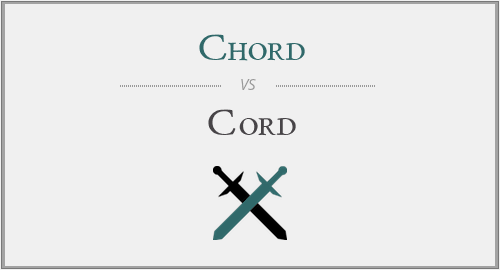Can one letter change the entire message of a word? Yes, it can. An amazing example to illustrate this is the pair of words "chord" and "cord". Simply adding or not adding the letter "h" will result in completely distinct definitions of these nouns.
Check these definitions and the explanations provided below. Make sure you always use "chord" and "cord" in the appropriate contexts and don't create texts or conversations containing errors due to confusing or misspelling them.
Chord vs. Cord
Generally, "chord" is confused for "cord" and vice versa because of their identical pronunciation. English speakers often choose not to pronounce, not even subtly, the "h" in "chord", which makes it difficult to distinguish whether they are referring to one noun or to the other. So misspelling "chord" and "cord" is a frequent error in English grammar, though it's easy to avoid it once you clearly understand what each word represents.
When do we use "chord"?
"Chord" is defined as two or more musical notes that are connected or played at the same time. This is why the word is mainly used when talking about music or musical instruments. The fact that it refers to sounds that are created due to two or more connected frequencies played together also generated the expression "vocal chords".
Example: You'll be able to play this song once you learn to play chords G and Em on the guitar. - "chords" is mainly used in music, referring to two or more musical notes played at the same time.
When do we use "cord"?
Cord has two equally important significations, yet distinct. Firstly, a "cord" is a thick string or a piece of a thick string. Secondly, "cord" is a synonym for the British word "flex", which means a piece of wire covered in plastic, mainly used at connecting electrical equipment to a power supply.
Example 1: Grab this cord and tie all those books together, tightly, to make sure they don't fall. - "cord" is defined as a thick string.
Example 2: He used an electrical cord to connect his equipment to the first power supply he found. - "cord" is also a plastic-covered wire sued to connect electrical equipment to a power supply.
Conclusion
"Chord" and "cord" might sound similar but they refer to completely different things. "Chord" refers to musical notes played together into a harmonious sound, whereas a "cord" is a thick string or a piece of wire. Simply remember these definitions to make sure you never use them wrongly.





Have a discussion about this article with the community:
Report Comment
We're doing our best to make sure our content is useful, accurate and safe.
If by any chance you spot an inappropriate comment while navigating through our website please use this form to let us know, and we'll take care of it shortly.
Attachment
You need to be logged in to favorite.
Log In